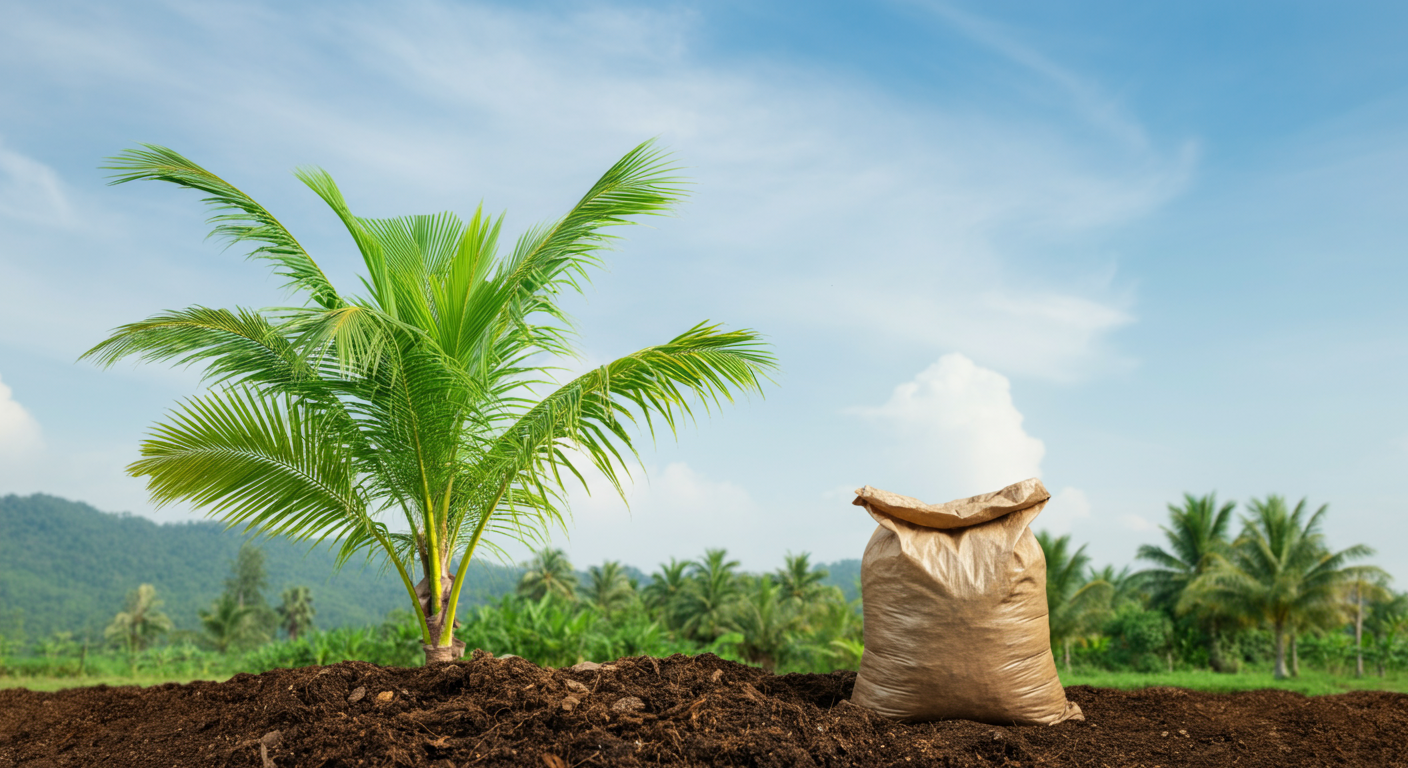As a perennial crop, proper care and management of coconut plantations have to be initiated at the seedling stage itself. A periodic supply of manures, fertilizers, and irrigation is needed throughout its life for higher yields and sustainable production.
The main source of nutrients is from Organic manures like cow dung, poultry manure, farm yard manure, compost, bone meal, fish meal, blood meal, green leaf manure, neem cake, groundnut cake, etc., and chemical fertilizers. Compost shall be prepared from coir pith enriched with useful microorganisms as well as from dried coconut leaves and organic wastes available in the coconut farm using earthworms (Eudrillus spp). Any of the above organic manure @ 20 - 50 kg per year may be applied for an adult palm after opening the coconut basin, preferably during the onset of the southwest monsoon. Application of Lime or dolomite @ 1 Kg/palm/year is suggested for acidic soils to correct the soil pH to near neutral. This will help in better uptake of nutrients. In addition to this Magnesium sulphate (MgSO4), 0.5 Kg/palm/year may also be applied for the coconut palms with yellowing symptoms. The chemical fertilizers shall be applied only after two weeks of lime/dolomite application.
In case of a shortage of cow dung or compost, green manure and cover crops shall be cultivated in coconut farms. Kolinji (Tephrosia purpurea), sunhemp ( Crotalaria juncea ), Pueraria (Pueraria phaseoloides ) are some of the green manure crops suitable for coconut farm. Cover crops like Mimosa invisa, Calapagonium muconoides also shall be utilized. Apart from this, Gliricidia maculata and Tephrosia candida are another good sources of nutrients and also protect the young seedlings during hot summer.
During pre-monsoon showers (April- May), cowpeas shall be sown in coconut basins for green manure. Uproot the cowpea once it starts flowering and mix well in the soil. The root nodules of leguminous crops being a rich source of nitrogen-fixing bacteria improve the soil fertility by converting the nutrients into easily available form.
The requirement of nutrients may vary, based on the soil in different agroclimatic regions where coconuts are grown. The general recommendation of chemical fertilizer is 500g Nitrogen,320g Phosphorus, and 1200 g potassium per palm per year. However, for a coconut farm with average management 340g N,170g P2 O5, and 680g K2O are suggested and in reclaimed clayey soils 250g N,350g P2 O5, and 900 g K2O may be required. Coconut farms situated in red loam soils 680g N,230g P2 O5, and 900g K2O are recommended.Apply manures and fertilizers in circular basins of 1.8 m to 2m from the base of the palm, incorporate and irrigate. Only ¼ th of the fertilizer dose recommended for adult palms is to be given in the first year of planting . During second year ½ the dose and ¾ doses at the age of 3rd year. From 4th year onwards full dose of recommended fertilizers may be applied.Sufficient moisture should be present at the time of manuring.

Hybrids & high-yielding palms with irrigated areas can go for a higher dose of 1 Kg N, 0,5 Kg P2 O5, and 2 Kg K2O per palm /year.
The chemical fertilizers shall be applied in 3-4 equal split doses for coconut farms with irrigation facilities. In low-lying lands, apply fertilizer in one single dose or in two split doses after the water table recedes.
Though the fertilizer recommendation is made generally by various research and development agencies, it is advised to go for an appropriate dose of manures and fertlilizers for various locations based on a soil testing report. A soil health card is issued by the govt. agencies after proper testing of soils. Proper soil sampling techniques have to be followed for a reliable test report. However, it is better to go for a balanced application of manures and fertilizers considering the cost-benefit analysis.
